Virgin Galactic launches VSS Unity space plane on final suborbital spaceflight with crew of 6 (photos, video)
It was Virgin Galactic's seventh commercial spaceflight mission and the company's second of 2024.
Virgin Galactic launched six people to suborbital space on Saturday (June 8), launching a Turkish astronaut and three space tourists on what was the final voyage of the VSS Unity space plane.
Unity, attached to the belly of its carrier plane Eve, took off from runway at Spaceport America in New Mexico at 10:31 a.m. EDT (1431 GMT) and carried to an altitude of 44,562 feet (13,582 meters) over the next hour, where it was dropped and ignited its rocket engine to carry two pilots and four passengers to space and back. The mission, called Galactic 07, reached an altitude of 54.4 miles (87.5 km) and marked the seventh commercial spaceflight by Virgin Galactic on Unity, which is being retired to make way for the company's new "Delta" class of spacecraft rolling out in 2026.
"I will need much more time to try and process what just happened," Tuva Atasever, the Turkish Space Agency astronaut on the flight, said in a post-flight press conference, adding that the view of Earth was indescribable. "It's not something you can describe with adjectives. It's an experiential thing … you just feel it in your gut."
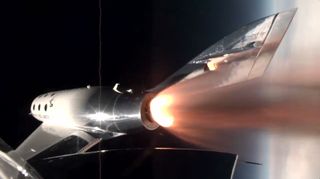
Atasever's trip on on Galactic 07 was brokered by Axiom Space, a company that also flew a Turkish astronaut to the International Space Station with SpaceX on the private Ax-3 mission earlier this year. Atasever was a backup astronaut on the Ax-3 flight and oversaw three different experiments on Galactic 07.
Joining Atasever on the Virgin Galactic flight were VSS Unity commander Nicola Pecile and pilot Jameel Janjua. Virgin Galactic pilots Andy Edgell and C.J. Sturckow, a former NASA astronaut, flew the VMS Eve carrier plane.
Related: Virgin Galactic launches 1st Ukrainian woman to space on Galactic 06
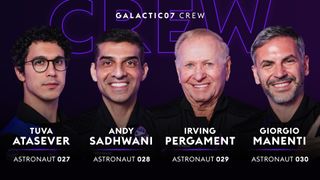
After Unity landed, Virgin Galactic unveiled the identities of the three paying passengers on the flight. They were:
Get the Space.com Newsletter
Breaking space news, the latest updates on rocket launches, skywatching events and more!
- Anand "Andy" Harish Sadhwani of California;
- Irving Izchak Pergament if New York;
- Giorgi Manenti of Italy.
Sadhwani was born in Houston and been fascinated with space since he was 5 years old after a tour of NASA's Saturn V rocket. He has a bachelor's degree in mechanical engineering from Carnegie Mellon University and dual master's degrees in mechanical engineering and aeronautics and astronautics from Stanford. He works as a principal propulsion engineer at SpaceX. He wore the flags of the U.S. and India on his flight suit to honor both his home country and that of his parents, according to a mission profile.
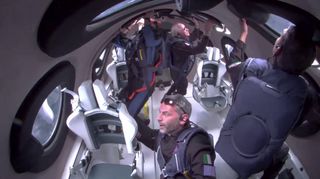
Pergament is a New York-based real estate developer who grew up in Israel and has had a lifelog dream to reach space. "My life is a blend of my love for my family, my professional success and philanthropy, and a continual chase after the thrill of flight, now reaching for the stars," he said in a statement. He wore the flags of the U.S. and Israel on his flight suit.
Manenti is a London-based hotel and resort investment strategy advisor who prefers travel experiences over material possessions, according to a mission profile. Seeing Earth from space was a surreal experience, he said. "The feeling of being on the other side is tremendously exciting, this time looking down, admiring Earth in its [majestic] splendor," Manenti said in a statement. He wore the flags of Italy and the European Union on his flight suit.
Unity's last flight
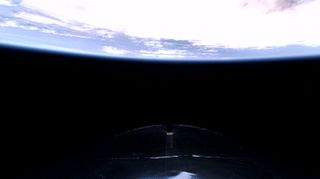
The VSS Unity space plane landed back at Spaceport America at 11:41 a.m. EDT (1541 GMT), marking only its seventh commercial spaceflight for Virgin Galactic and 12th crewed spaceflight overall. In all, Virgin Galactic flew the space plane just 32 times, including non-space test flights.
But Unity will fly no more. Instead, Virgin Galactic is grounding Unity's SpaceShipTwo design in favor of its new "Delta Class" of spacecraft that are designed to fly more often.
"This vehicle was revolutionary," Virgin Galactic president Mike Moses said in the post-launch press conference. "We tested it, we flew it, we demonstrated and prove to the world that commercial human spaceflight is possible with private funding for private companies."
Unity's first fully-crewed suborbital spaceflight launched Virgin Galactic's founder, the billionaire Sir Richard Branson, and others in July 2021 on the Unity 22 mission, which followed three previous skeleton-crewed test flights. By 2023, the company was flying monthly flights for space tourists and research customers.
"So, seven commercial space flights, a single vehicle flying six times in six months last year, that's groundbreaking," Moses said. "The fact that we can take this vehicle back to back to back on a monthly basis is is really revolutionary."
The new Delta class of spacecraft will be able to fly at least twice a week, about eight times the rate of SpaceShipTwo, with Virgin Galactic planning to build at least two to start its new fleet.
"We're going to field in 2026 two spaceships, our mothership Eve, that's 750 astronauts a year going to space," Moses said of the new fleet's flight capacity. "That's more than have gotten to space in the 60 year history of spaceflight to date."
A pricey ride for thrills ... and science
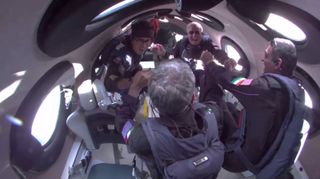
Galactic 07 was Virgin Galactic's second mission of 2024. Its first flight of the year, Galactic 06, saw the first Ukrainian woman reach (suborbital) space.
Tickets for these flights are quite the investment, typically selling for $450,000. Passengers on Virgin Galactic's spaceplane experience a few minutes of weightlessness and get to see a view of Earth that very few get to see in a lifetime.
The suborbital spaceflight will also carried research payloads from Purdue University and University of California, Berkeley. According to the company's statement, Purdue's experiment focused on the "propellant slosh in fuel tanks of maneuvering spacecraft" while U.C. Berkeley tested out a new type of 3D printing in microgravity.
Since 2018, Virgin Galactic has flown payloads as part of NASA's Flight Opportunities program and most recently was selected to be a contracted flight provider for NASA for the next five years.
Axiom Space, a Houston-based private spaceflight company, has completed three crewed trips to date to the International Space Station, and has its fourth mission, (Ax-4), targeted for October at the earliest. The company has partnered with Virgin Galactic on several previous flights.
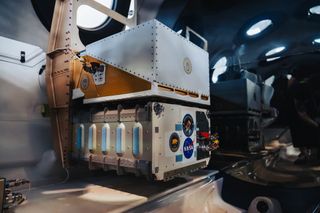
"Axiom Space's commitment to enabling access to space and providing opportunities for scientific discovery beyond Earth aligns closely with Virgin Galactic's mission," Tejpaul Bhatia, chief revenue officer of Axiom Space, said in Virgin Galactic's statement. "We are very excited about this upcoming Galactic 07 flight."
The Galactic 07 mission follows the previous in January where an alignment pin detached unexpectedly from VMS Eve after VSS Unity separated. Although no one was in any danger on the flight, the company notified the U.S. Federal Aviation Administration (FAA) so that both entities could conduct an investigation of the issue to prevent a repeat for future missions.
Corrective steps were taken by Virgin Galactic to ensure there will not be a repeat on Galactic 07.
Editor's note: Space.com Editor-in-Chief contributed to this report. This story was updated at 5 p.m. ET to include details about the final flight of VSS Unity and its launch success.
Join our Space Forums to keep talking space on the latest missions, night sky and more! And if you have a news tip, correction or comment, let us know at: community@space.com.

Meredith is a regional Murrow award-winning Certified Broadcast Meteorologist and science/space correspondent. She most recently was a Freelance Meteorologist for NY 1 in New York City & the 19 First Alert Weather Team in Cleveland. A self-described "Rocket Girl," Meredith's personal and professional work has drawn recognition over the last decade, including the inaugural Valparaiso University Alumni Association First Decade Achievement Award, two special reports in News 12's Climate Special "Saving Our Shores" that won a Regional Edward R. Murrow Award, multiple Fair Media Council Folio & Press Club of Long Island awards for meteorology & reporting, and a Long Island Business News & NYC TV Week "40 Under 40" Award.